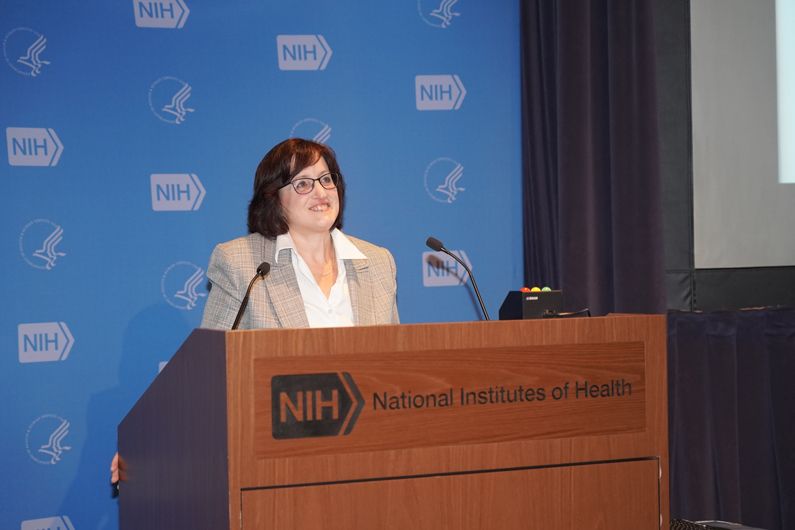Healthcare advocate, parent of teen with chronic illness speaks at NIH Health IT Day

Lisa Danielpour, a healthcare advocate and mother of a teen with Crohn's Disease, was the guest speaker at the 2018 NIH Health Information Technology Day at the NIH Clinical Center. She spoke about the Clinical Center's patient portal and how healthcare recordkeeping technology has positively impacted her son's healthcare and the research about his illness.
Danielpour told the audience, in October, about her son Josh's journey. In 2014, he was a straight-A student, avid learner and competitive, athletic 13-year-old. But that year, "everything changed".
In August 2014, Josh was diagnosed with Crohn's Disease, an inflammatory bowel disease. Over the next year, he would undergo six colonoscopies and endoscopies. Josh did not respond to treatment and became sicker and sicker.
"He was in the hospital more than he was out," Danielpour said.
By February 2015, curled up in a ball with abdominal pain and fighting constant bouts of diarrhea, Josh told his parents he needed to go to the hospital. By this point, the inflammation from the disease had spread to his entire digestive tract. The specialists at their home hospital in Cleveland, University Hospitals Rainbow Babies & Children's Hospital, consulted with other gastroenterology experts around the country, but no one had seen a case like his, Danielpour said.
"To watch your child suffer [and] to know there is only so much medical science can do to help is beyond painful. We tried to think of anything we could do to help him and learn everything we could."
Josh was transferred by medical flight from his hospital in Cleveland to Children's Hospital of Philadelphia (CHOP). CHOP then consulted with NIH for help. The Danielpours were familiar with NIH – Josh's father, David, was a senior staff scientist at the NIH National Cancer Institute before moving to Cleveland in 1998.
The personal health record empowers the patient with access to information and enhances the patient's safety, communication and experience. For those with chronic illness or medical complexities, it helps you learn what to track and monitor and be able to do it for yourself." — Lisa Danielpour
Dr. Ivan Fuss, a National Institute of Allergy and Infectious Diseases staff clinician working in the NIH Clinical Center, recommended a new medication for Josh, and he slowly started to respond.
After a combined eight months at CHOP and Rainbow Hospital, Josh finally got to go home. In January 2016, Josh started to come in person to the NIH Clinical Center for treatment and saw Fuss as well as Research Nurse Kim Montgomery-Recht.
"We really appreciate all the care that he got," Danielpour said.
Unfortunately, this was not the end of his medical issues. A liver biopsy showed he was in the early stages of primary sclerosing cholangitis, a long-term progressive liver disease associated with Crohn's Disease. When Josh developed a limp in 2016, NIH specialists diagnosed avascular necrosis, the death of bone tissue due to a lack of blood supply, in his right hip, most likely a side effect of steroids. Josh quickly had to have surgery elsewhere to mitigate the impact on his femur bone.
Throughout this experience, Danielpour has learned the importance and power of an online medical record.

"The personal health record empowers the patient with access to information and enhances the patient's safety, communication and experience," she said. "For those with chronic illness or medical complexities, it helps you learn what to track and monitor and be able to do it for yourself."
"For those who are healthy, the personal health record helps to track preventative care. It's important for self-care and self-advocacy, but most of all it's a wonderful and powerful physician and nursing tool to motivate and engage patients and families in their own healthcare," she said. "The more that patients and families are looking at their own information and understanding it, not only are they playing a more active role as we want in patient-centric care, but also, it can save time for the medical professionals because you can focus more on the big picture … and patients can better think about the questions they have ahead of time before seeing their doctors."
This is particularly powerful at the NIH Clinical Center where many patients and families are coming from locations across the country and around the world. Having easy access to medical records helps patients and families keep track of their own health care and ensure that doctors at home hospitals and NIH are up to date on their care and treatment.
"Josh, I am happy to report, is stable now and what a beautiful word stable is," Danielpour said. "He is doing great in school and getting back to as normal a life as possible."
Josh, who missed most of eighth and ninth grade, is now a 17-year-old high school senior who plans to attend Case Western Reserve University and major in biomedical engineering. He is learning self-care and self-advocacy, more about his diseases and how to continue to take care of himself, she said.
Danielpour thanked the doctors, research nurses and countless staff at the NIH Clinical Center who contributed to Josh's care. "We're really grateful for the wonderful culture of care and research at NIH. You make all the difference for the patients and families that you see."